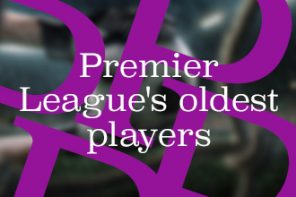After Iain Macintosh’s dismal failure with Everton on Football Manager 2017, we felt that it would be best for all concerned if we sent him back to school. And so, he visited the headquarters of Sports Interactive, the makers of Football Manager, to ask the people who actually make the game where he went wrong. This was a condition of his continued employment with The Set Pieces.
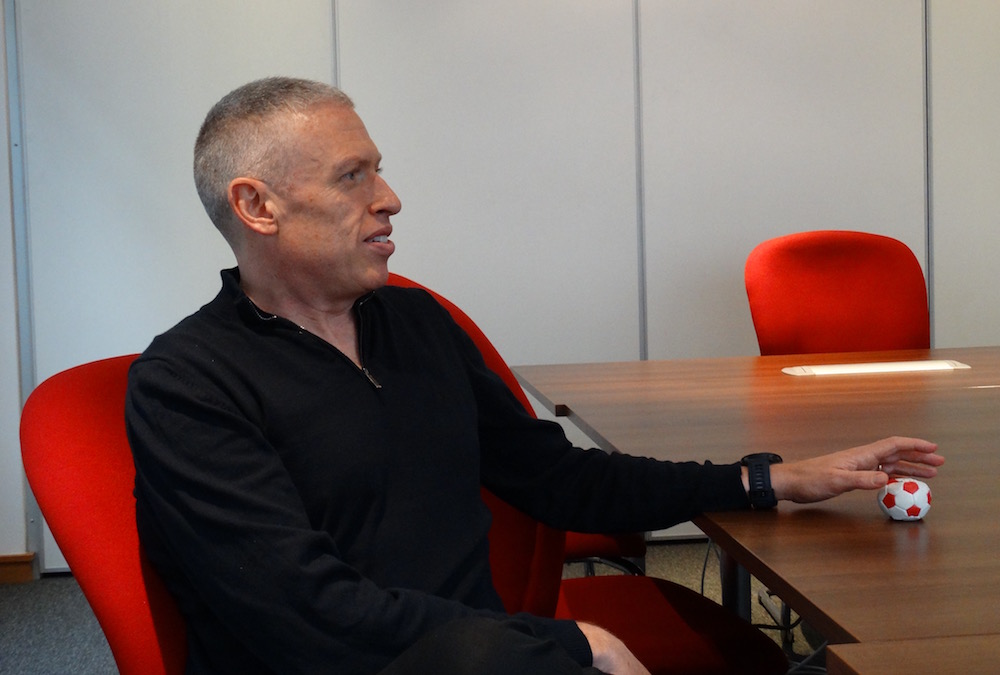
THE CREATOR
“I know,” I tell him with a cocky smirk.
Paul Collyer, co-creator of the Football Manager franchise looks at me hard. There’s sincerity there. Compassion. Maybe even love.
“Look at me, son,” he says. “It’s not your fault.”
“I know,” I say. But I can’t look him in the eyes.
“It’s not your fault,” he says again.
“I know!” I tell him, but my bravado is slipping.
“No,” he says quietly. “No, no, no. It’s not your fault. It’s not your fault. It’s not your fault.”
I stare at the floor for what seems like an eternity. Hot tears start to well up in my eyes.
“Don’t fuck with me,” I whisper.
“It’s not your fault,” he says again.
I push him away and try to shout at him, but the tears are coming now and I can’t stop my voice from cracking. I’m going. I’m going. I’ve worked so hard to keep it all together, to keep it altogether in front of my friends, in front of my family, but Paul can see through me. I can’t hide this from him.
“It’s not your fault,” he says and I am broken. I collapse into him and everything, the run of defeats, the sacking, Gerard the Snake, Yannick bloody Bolasie and that useless bollock Ashley Williams, it all comes out in his arms.
I jerk back to reality. We’re in the headquarters of Sports Interactive, creators of Football Manager. Paul Collyer, who created the original Championship Manager with his brother, and still oversees the ongoing evolution of the match engine, is staring at me.
“Are you ok, Iain? You seemed to drift off there for a second.”
“Yes,” I say. “Sorry, you were saying that it wasn’t my fault.”
“No, it wasn’t.” he says. “When I read it, I thought we were talking about the real Ronald Koeman, because it sounds exactly like the real thing. I read it and I thought, that is just like Everton. They lack leadership and maybe that’s the thing you didn’t address. You didn’t bring in new players.”
I tell him that I turned the transfers off because, and this felt like a good idea at the time, I didn’t want to overload the reader with new information at the start of what I’d expected to be something of a saga. His eyes widen.
“You started without transfers?” he says. “Well, that’s the way to play it. That’s the hardcore. Good for you. But I think it’s a really difficult job this season and I’m not surprised people are struggling. If Koeman, in real life, gets anywhere near the top six, I will be amazed.”
Later, an SI insider will tell me that Paul’s feelings are more than just a hunch. According to their stats, more managers are being sacked from Everton on Football Manager 17 than any other British club. And it really doesn’t help if, like me, you attempt to manage them with a more ‘realistic’ managerial profile.
“You’re a purist,” he says. “That’s fine, but that’s why it didn’t work. You need to be an international footballer otherwise the players won’t respect you. If a world famous name like Koeman is struggling to get them onside then Sunday League’s Iain Macintosh isn’t going to succeed either. I love that you went for the purist challenge, but I really wish I could have spoken to you before you’d started.”
Paul is a perfectionist. He finds it hard to play the game for fun now because he’ll sit there looking for problems in the match engine and if he spots them, he’ll want to immediately produce a new patch to fix them.
“The challenge for me, writing the match engine, is to make the game as challenging as possible,” he tells me. “I want the other teams to be smart. I don’t want it to be impossible of course, but I think if people are winning the league with teams in the first season that wouldn’t win the league in real life then something is clearly wrong. So, for me, it’s good that you found it hard.”
“You see, you have to make the AI responsive because in Football Manager, it’s inevitable that the human is going to be better.” He pauses and looks at me. “Well…not inevitable. But…” There is an awkward pause. “You’ll get there, Iain,” he says kindly. “You’ll get there.”
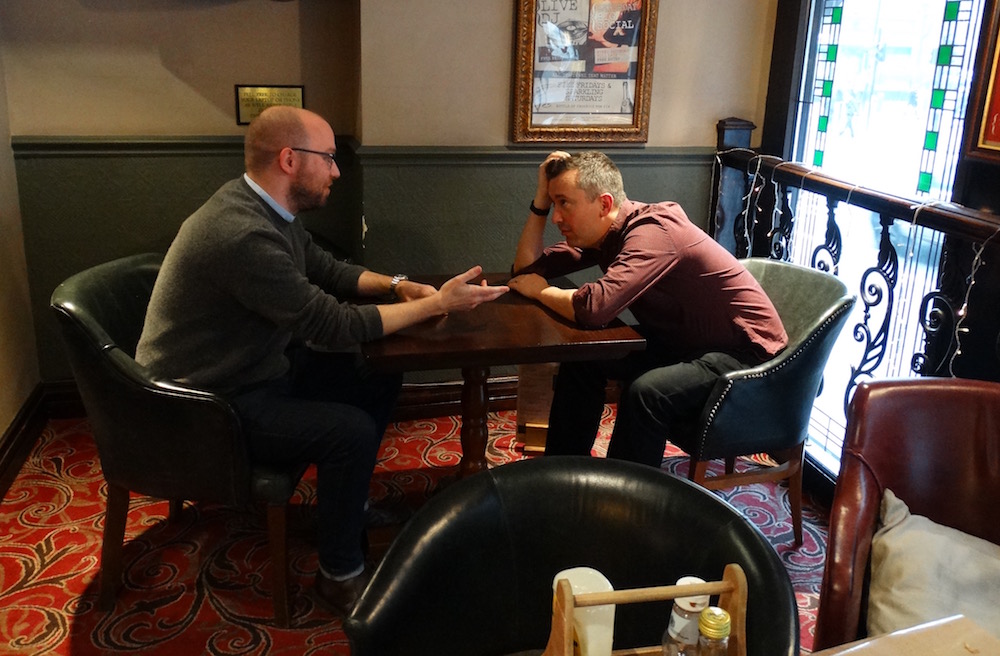
THE RESEARCHER
“What did I do wrong, Steve? What did I do wrong?”
Stephen Davidson, Football Manager researcher, sips his orange juice, using the time to choose his words carefully.
“I’ve been thinking about this for a while,” he says. “And there’s probably no conclusive answer. It’s just like real life. There’s no one thing, just a lot of moving parts. There’s nothing that I looked at and thought, oh no, what’s he doing there? I think you were right to note that your players were not performing consistently. Gerard the Snake would rise and fall and you were always questioning whether he should play. That’s a consistency issue, a hidden attribute. How frequently will a player perform at his highest level.”
“You were also hamstrung by the fact that you weren’t bringing any new players into the club. You identified quite quickly that the formation you were playing, with the inside forwards, sometimes left guys isolated, but you couldn’t do anything about it. You just had to keep picking from the same group of people! I noticed that you brought Liam Walsh onto the bench, but you didn’t use him. I think you could have looked to your reserves more, brought your own players in. But then you never really had the time.”
“Is it just Everton?” I ask. “Are they just really shit?”
“I think you’ve got a few problems there,” he says. “You had different formations for different situations and that’s a good idea, but it didn’t work out for you. Everton’s issue is that you have some specialists, but some that aren’t consistent and you’re thin on other options. What you needed to do was get to January then get rid and replace. You were hampered by an ageing defence in terms of pace. You gave Jagielka a new contract but there’s no room for sentimentality.
“But you put the hours in, you really did that. I felt for you. We’ve all been there. You have one little thing go wrong and then everything collapses. But your managerial experience didn’t help you at all. The players just wouldn’t have respected you and that’s why it ended so quickly.”
“Help me, Steve,” I implore him. “Help me to beat Alex Stewart in the Celtic vs Rangers challenge.”
“There are two things to focus on. I see that you’re going to be pushing to develop your own youngsters. Think about the factors that combine to help them reach their potential. It’s not guaranteed that highly rated players will make it. Ideally, they should be ambitious. They should be determined too. But think about your staff as well. Who’s teaching your players? What are your facilities like. And don’t lose sight of the first team. As with Everton, you’re not going to be given much time.”
“When the games start, keep doing your homework. Look at how your opponents perform, but in particular look at how they perform against bigger opponents. They’ll have something that they do. Don’t let them do it. If they have a quick forward, don’t give him the room behind you. Pay attention to that sort of thing. Play a little deeper. It varies from case to case, and it sounds so simple, but do your homework. Football Manager is like playing chess. But the pieces are all moving. And they have their own brains. It’s chaos.”
On reflection, I’m not bothered about Football Manager now. I think I just want to play with Steve’s chess set.
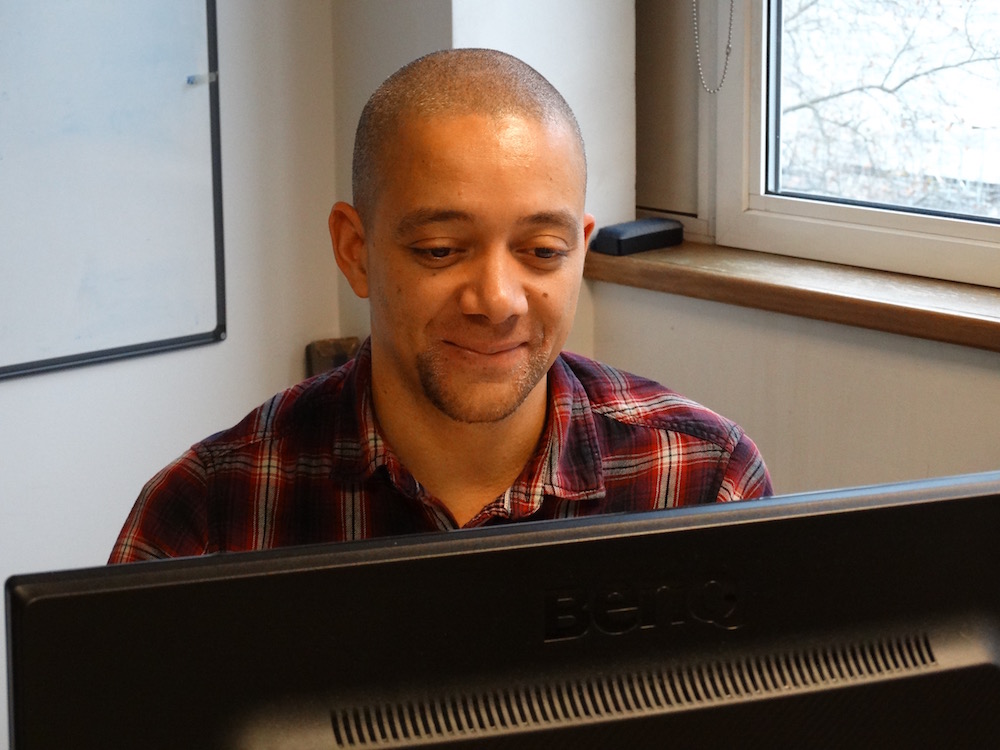
THE PRODUCER
“I’ve been having a read!” Grant Appleyard, senior producer on the Football Manager series, laughs as I enter his office. “I love the ending!”
“The most important thing is that I kept my dignity,” I tell him. “I didn’t let anyone see me hurting.”
Grant has been with the SI team since 2000. He looks after teams of staff within SI, focusing on gameplay and AI and also liaises with publishers Sega.
“Help me, Grant.”
Grant nods reassuringly and directs me to his computer screen. He has the tactics page for his Newcastle team up for perusal. It looks settled and happy. Successful. I feel a pang of jealousy.
“The first thing you need to focus on is the match itself,” Grant tells me. “Now here’s my Newcastle team. It’s a very difficult gig, this. If you’re not fourth or higher by February, knives are out. It’s high pressure, as your Celtic game will be. And it took me a while to realise this, but going for a more cautious approach really helps. Don’t be afraid to use defensive tactics.”
This much, upsettingly, I’ve learned since I was sacked. There are two regular tactical errors that Football Manager players make. The first is to assume that ‘defensive’ mode is something you choose only for the last five minutes when you have a lead to protect. The second is to use ‘control’ as a sort of hands-off, slow build-up, low risk approach. Teams using ‘defensive’ tactics still try to score. They still try to attack. They’re just a bit more choosy. And teams that seek to ‘control’ the game are always looking to attack, always looking to commit numbers. And so ‘defensive’ is not strictly speaking a defensive tactic. And you can try to ‘control’ but it doesn’t necessarily mean you will.
“In my game now,” Grant says, “my main core tactic is defensive. And if I’m 1-0 up at half-time, I’ll pull a striker off and pack the midfield. You’re still trying to score, but you’re just being much more careful about it. Lock it down. It’s really worked for me. And if you’re not winning, you can go up through the gears, go more attacking.”
“I have three tactics that my players have learned to the maximum. And remember that one way to get individual tactics higher is to leave them set. So if you’ve just played a 4-4-2, but you know you’re playing 4-3-3 next week, change it to 4-3-3 as soon as the game is over and they’ll focus more on that between the games. That can really help.”
“How do you look at your roles?” he asks me. “Seasoned players like yourself often overlook the importance of the player roles. But I will go along the lines making sure that everyone is an expert at what they do, full green bars, making sure I’ve picked the most apt role every single time. I’ve found that really works for me.”
“When it comes to training, try to cover everything. I go from one week to the next, switching from ball control to attack to defending, making sure we do it all. And I make sure that the level of intensity goes up and down. If it’s an international week, set it to high, use the extra time. If you’ve got two or three fixtures in a week, set it to low, keep your players fresh.”
“And speaking of which,” he continues, “make sure you use your reserve team to improve the match sharpness of the first team players, especially when they’re returning from injury. The key thing is not to stretch them. If the game says give them 60 minutes, I’ll say 45. Just a little less. You’ll never push them too far that way, but you get the sharpness back.”
“This is all great,” I tell him. “But I’ve got a new challenge coming up. I need to beat Alex Stewart’s Rangers and I need to do it in style, building my own empire at Celtic, moulding my young players into superstars.”
“Go and look at the international youth squads,” he tells me. “And just take the cream of the crop. They’ll come to you. They’ll want to. Celtic are a big club. Whack them in the reserves and develop them. Their potential will be high. But you might want to look a little further afield than Scotland’s kids. Maybe something like France and Spain. See who you can pick up.”

THE ANALYST
Tom Davidson knows Football Manager. It’s his job, his actual job, to play it all day and every day. He’s helped me before, though perhaps no-one could have helped me enough to keep me in a job. But now I need his help once again. I’ve laid down three tactics for my Celtic side. And I am so anxious to make sure that I’m doing anything wrong that I’ve been second guessing myself all week long.
“Tom,” I say, pushing my laptop towards him. “Is there anything here that screams, ‘Jesus Christ! You’re going to get sacked again!”
Tom has a good look around my base tactics, a 4-4-1-1. He clicks players, he checks attributes and then he smiles.
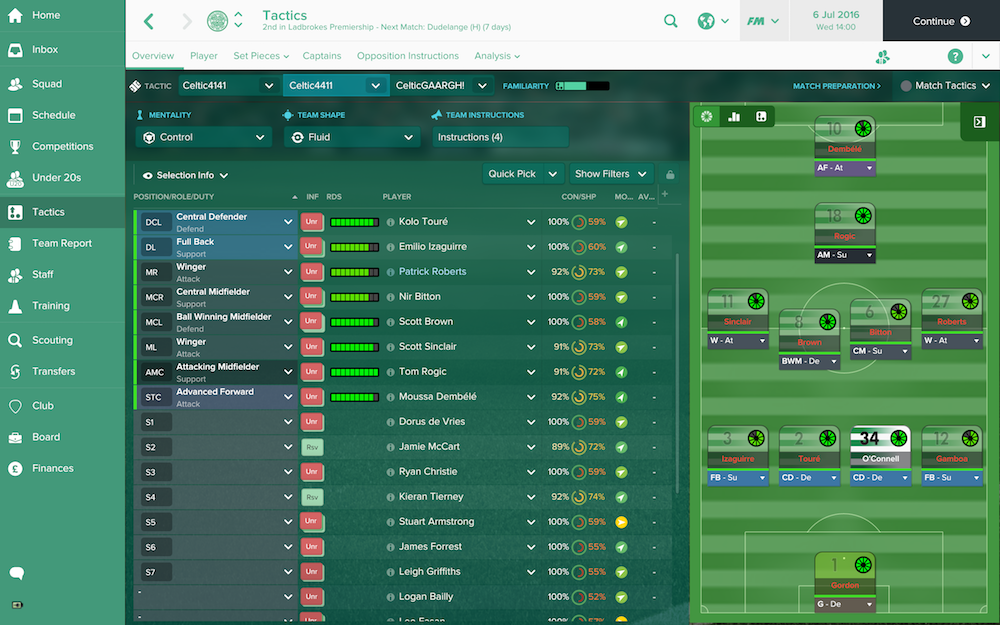
“It seems very solid,” he says. “You’ve got a flat midfield, these are vital. Rogic offers creativity. Sinclair and Roberts should be able to get up as well, they’re both quick, so when you attack you should have four men up front. The two midfielders should dominate the middle of the park and that means the wingers will be confident to get forward. No, there’s nothing there that strikes me as a red flag.”
“When we’re leading and I want the team to shut the game down, we’ve got this,” I tell him. “But I’m not sure whether or not to use defensive or controlling tactics.”

“If you’ve got a technically advanced squad,” Tom says, “and Celtic in their league should be that, you can have this tactic on control. The problem with control is that it requires technical skill as a base point, especially if it’s combined with retaining possession. Control slows the tempo, it plays short simple passes, so you need players who can actually play lots of passes.
Defensive is good if they start to make chances and you really want to guard yourself. It’s case by case really. If you’re playing one of the bigger sides and the last 15 minutes they’ve dominated possession you’re noticing that your pass completion rate is dropping, it’s time to make a change. That said, you’re always still susceptible to a goal out of the blue at any time. That’s football, there’s nothing you can do about it.”
“This is what I plan to use if I really want to go for it,” I tell him.
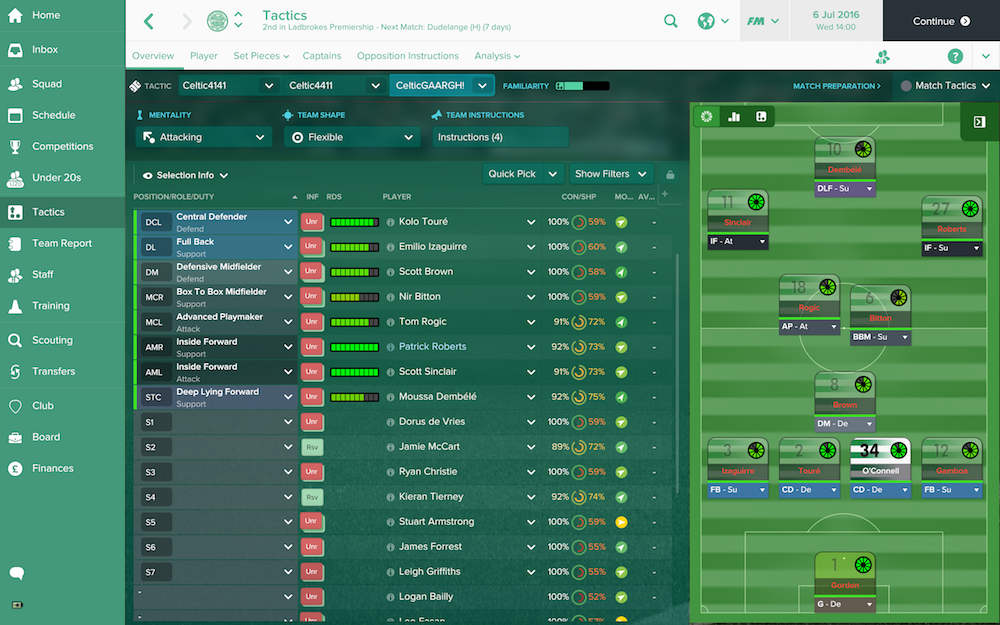
“Now this, I really like,” he says. “The little triangle to cover the defence, the full backs to provide width. I like the use of the box-to-box midfielder too. The box-to-box midfielder can be crucial, especially if they’re intelligent. More intelligent players will assess the game as it develops and if they feel they need to provide extra cover in defence, they’ll do that. You should attack well with this though. With that advanced playmaker, you’ve pretty much got five people up front when you attack.
“And finally,” I tell him. “Here are my team instructions. And these are going to be pretty consistent across all tactics. I’m building a Celtic Way. ”

“This is the most important thing you can do as a manager,” says Tom. “You have to know your philosophy. You have to look for players who fulfil the roles that you’re playing so that everyone knows what their job is. Sometimes, I’ve even overlooked superior players in favour of ones who can better fit my system. That’s the way to do it.”
“So, am I going to be ok?”
“It all looks very sound,” Tom tells me. “Once they settle into these tactics, you should be absolutely fine.”
And for the first time in two weeks, I feel the sun breaking through the clouds.
Is Iain right to feel confident? Will he guide Celtic into a new era of home-produced attacking success? Or will Alex Stewart’s moneyballing leave him sobbing into his touchpad once again? Find out next week when the FM Project begins again.





